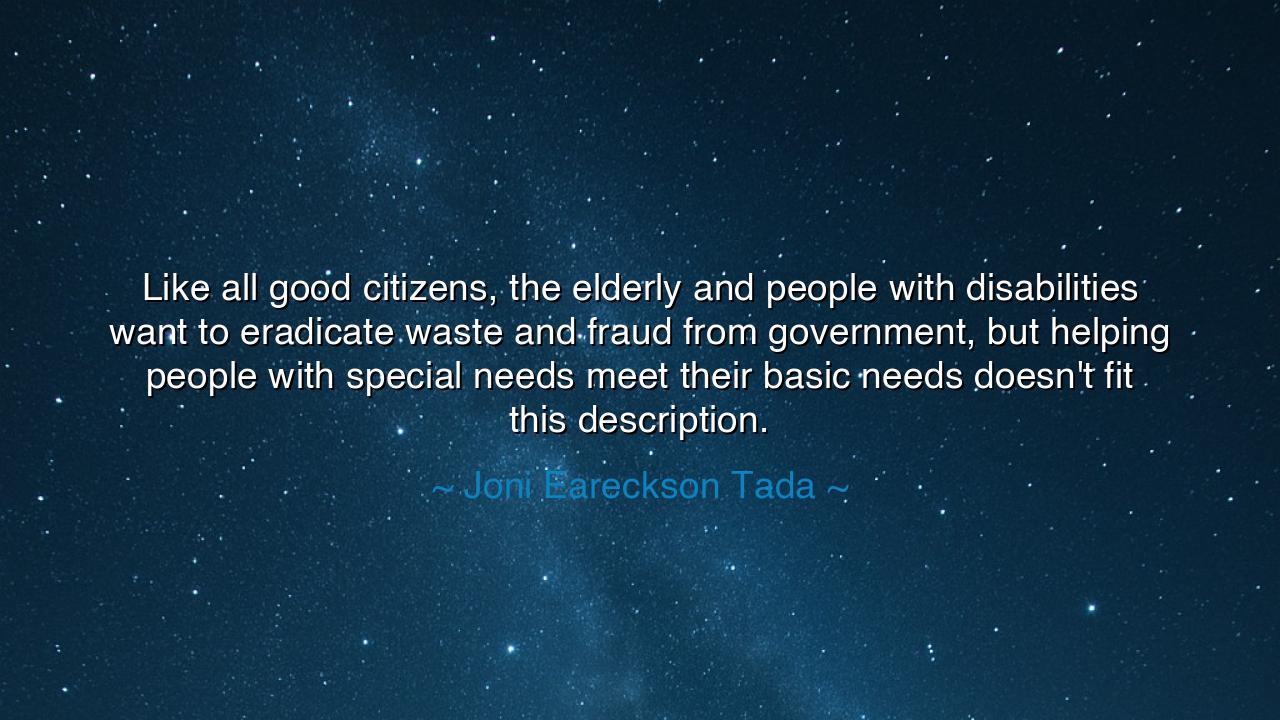
Like all good citizens, the elderly and people with disabilities
Like all good citizens, the elderly and people with disabilities want to eradicate waste and fraud from government, but helping people with special needs meet their basic needs doesn't fit this description.






"Like all good citizens, the elderly and people with disabilities want to eradicate waste and fraud from government, but helping people with special needs meet their basic needs doesn't fit this description." – Joni Eareckson Tada
In these gentle yet powerful words, Joni Eareckson Tada speaks not only as an advocate for the disabled but as a moral voice for compassion, justice, and wisdom in governance. Hers is a message born from personal experience and deep empathy—a reminder that true citizenship is not about cutting costs at the expense of mercy, but about aligning efficiency with humanity. She reminds us that to support those who struggle is not indulgence—it is the fulfillment of our most sacred civic duty. For a society’s greatness is not measured by how it rewards the powerful, but by how it cares for the vulnerable who depend upon its conscience.
The origin of this quote lies in Tada’s lifelong advocacy for people with disabilities. Paralyzed at the age of seventeen after a diving accident, she transformed her suffering into service. Through her ministry, Joni and Friends, she became a voice for those often unheard, pressing governments and societies alike to remember that compassion is not waste, and assistance is not fraud. Her words were likely spoken amid debates on budget reform and welfare policy, where the needs of the disabled and the elderly were too often dismissed under the guise of fiscal prudence. In this context, she delivers a profound rebuke: charity is not corruption, and empathy is not excess.
Her insight cuts to the heart of a recurring danger in governance—the tendency to conflate care with cost. Throughout history, nations have risen and fallen by how they treated their weakest members. Ancient Greece, at its height, taught that civic virtue included the duty of the strong to defend the frail. In contrast, regimes that viewed compassion as waste soon crumbled, for they forgot that the moral health of a nation sustains its material wealth. Tada’s words remind us that efficiency without empathy is cruelty disguised as order, and that justice without mercy is tyranny in fine clothing.
Consider the story of Franklin D. Roosevelt, himself a man who battled physical disability. Stricken with polio, he knew the daily weight of limitation. Yet from that struggle arose one of the greatest reformers in modern history—a leader who built social safety nets not out of pity, but out of principle. The New Deal’s programs for the elderly, the poor, and the disabled did not weaken America; they strengthened it. They forged solidarity from suffering and proved that a nation which invests in the dignity of its citizens builds not dependence, but resilience. Tada’s quote echoes that same moral conviction: that the measure of good governance is not austerity, but compassion guided by integrity.
Her words also illuminate the inner nobility of those she defends. The elderly and people with disabilities, she says, are not enemies of efficiency—they too wish to see waste and fraud eliminated. They seek fairness, not favoritism; dignity, not indulgence. What they oppose is the false narrative that their survival is an economic burden. To deny assistance to those in need under the banner of reform is to forget that every society is a covenant between generations—between the strong and the frail, the able and the weary. When that covenant is broken, no treasury can redeem the loss of honor that follows.
There is a spiritual truth at the heart of Tada’s teaching. She speaks as one who understands suffering not as shame, but as a crucible of compassion. To help the weak is to acknowledge our own fragility; to deny them is to deny our shared humanity. Her words are a call to see beyond numbers and budgets, to recognize the sacred image within every soul. Governments may count coins, but a just society must weigh hearts—for in the balance between austerity and mercy lies the fate of civilization itself.
The lesson, then, is clear and eternal: compassion is not waste—it is wisdom. Helping those with special needs to meet their basic needs is not charity, but justice fulfilled. To abandon them is to impoverish our own souls. The strength of a people does not lie in how fiercely they protect their resources, but in how willingly they share them where life demands it most.
And so, the practical actions are these: Support policies that uphold both integrity and compassion. Advocate for programs that serve without waste but never forsake the human heart. If you lead, lead with mercy; if you serve, serve with dignity; and if you judge, remember that the true measure of a nation is not its wealth, but its willingness to care for those who cannot stand alone. For as Joni Eareckson Tada teaches, to lift another is not to lose strength—it is to reveal the very purpose for which strength was given.






AAdministratorAdministrator
Welcome, honored guests. Please leave a comment, we will respond soon